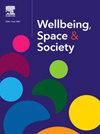干预措施可以减轻家庭过度拥挤对健康的不利影响:英国城市背景下利益相关者参与的快速现实主义回顾
IF 2.2
Q2 GEOGRAPHY
引用次数: 0
摘要
在英格兰,家庭过度拥挤的情况有所增加。然而,关于如何减少过度拥挤对健康/福祉的影响的综合证据有限。方法对英语同行评议和灰色文献进行快速现实回顾,这些文献来自英格兰城市背景的可比较环境,涉及家庭过度拥挤/健康结果。检索MEDLINE、EMBASE、Web of Science、SCOPUS及相关灰色文献(01.6.23,07.03.25更新)。两个专家小组通报了审查情况。第一组是有伦敦过度拥挤生活经历的人;第二届来自伦敦、索尔福德和唐卡斯特(英格兰)的地方和地区政府代表。两个小组都为指导范围/文献鉴定和测试/改进方案理论作出了贡献。最后的全文筛选和质量评估由两位独立的研究人员完成。结果共纳入同行评议论文30篇,文献27篇。来自多个国家的同行评议文献,研究设计和质量各不相同,包含14项经评估的干预措施,涉及三类:重新安置(n=6);家庭改善(n=6);多部门合作(n=2)综合了同行评议文献、专家小组评论和灰色文献,确定了可能促进或阻碍实现积极幸福结果的背景和机制。人们不愿意在其他地方重新安置,房屋的改善可能会减轻过度拥挤的最坏影响,而居民可能会从更好的医疗协调中受益。结论其他干预措施,如家庭改善和改善医疗保健协调/获取,可以解决居民在拥挤的住宿不能或不希望移动时的健康问题。本文章由计算机程序翻译,如有差异,请以英文原文为准。
Interventions that could mitigate the adverse effects of household overcrowding on wellbeing: A rapid realist review with stakeholder participation from urban contexts in England
Background
Household overcrowding has increased in England. However, there is limited synthesis of evidence about what can be done to reduce the impact of overcrowding on health/wellbeing.
Methods
A rapid realist review of English language peer-reviewed and grey literature of interventions from comparable settings to urban contexts in England that addressed household overcrowding/health outcomes. A search was conducted (01.06.23 and updated on 07.03.25) in MEDLINE, EMBASE, Web of Science, SCOPUS and of relevant grey literature sources. Two expert panels informed the review. The first comprised individuals with lived experience of overcrowding in London; the second local and regional government representatives from London, Salford and Doncaster (England). Both panels contributed to guide the scope/literature identification and test/refine programme theories. Final full-text screening and quality appraisal were completed by two independent researchers.
Results
Thirty peer-reviewed papers and 27 documents from participating local authorities were included. The peer-reviewed literature, from multiple countries and of variable study designs and quality, contained 14 evaluated interventions across three categories: Rehousing (n=6); Home improvements (n=6); Multisectoral collaboration (n=2). A synthesis of the peer-reviewed literature with expert panel comments and grey literature, identified contexts and mechanisms that could facilitate or hinder achievement of positive wellbeing outcomes. There was reluctance to be rehoused elsewhere and home improvements may alleviate the worst impacts of overcrowding, while residents may benefit from better healthcare co-ordination.
Conclusions
Other interventions such as home improvements and improved healthcare co-ordination/access could address wellbeing when residents in overcrowded accommodation cannot or do not wish to move.
求助全文
通过发布文献求助,成功后即可免费获取论文全文。
去求助
来源期刊

Wellbeing Space and Society
Social Sciences-Social Sciences (miscellaneous)
CiteScore
2.70
自引率
0.00%
发文量
46
审稿时长
124 days
 求助内容:
求助内容: 应助结果提醒方式:
应助结果提醒方式:


